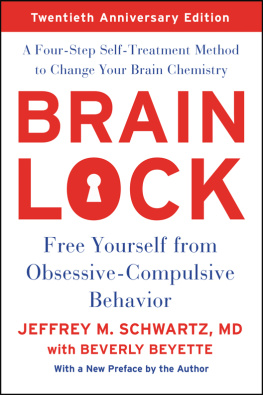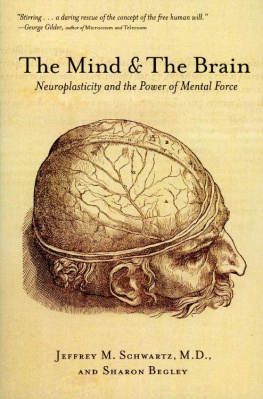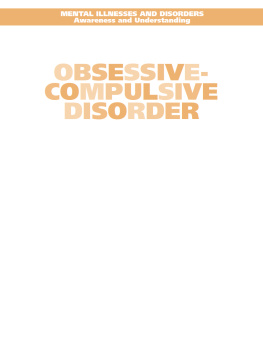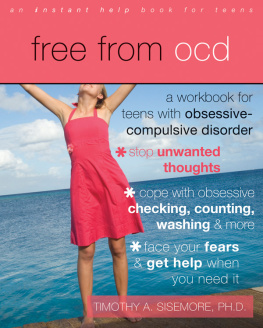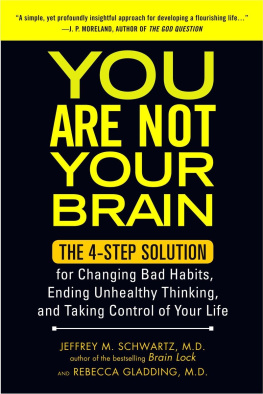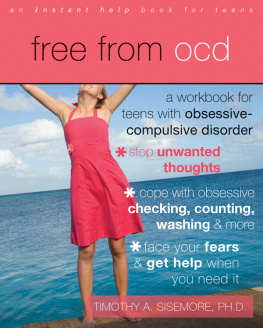Jeffrey M. Schwartz - Brain Lock, Twentieth Anniversary Edition: Free Yourself from Obsessive-Compulsive Behavior
Here you can read online Jeffrey M. Schwartz - Brain Lock, Twentieth Anniversary Edition: Free Yourself from Obsessive-Compulsive Behavior full text of the book (entire story) in english for free. Download pdf and epub, get meaning, cover and reviews about this ebook. year: 2016, publisher: Harper Perennial, genre: Art. Description of the work, (preface) as well as reviews are available. Best literature library LitArk.com created for fans of good reading and offers a wide selection of genres:
Romance novel
Science fiction
Adventure
Detective
Science
History
Home and family
Prose
Art
Politics
Computer
Non-fiction
Religion
Business
Children
Humor
Choose a favorite category and find really read worthwhile books. Enjoy immersion in the world of imagination, feel the emotions of the characters or learn something new for yourself, make an fascinating discovery.
- Book:Brain Lock, Twentieth Anniversary Edition: Free Yourself from Obsessive-Compulsive Behavior
- Author:
- Publisher:Harper Perennial
- Genre:
- Year:2016
- Rating:3 / 5
- Favourites:Add to favourites
- Your mark:
- 60
- 1
- 2
- 3
- 4
- 5
Brain Lock, Twentieth Anniversary Edition: Free Yourself from Obsessive-Compulsive Behavior: summary, description and annotation
We offer to read an annotation, description, summary or preface (depends on what the author of the book "Brain Lock, Twentieth Anniversary Edition: Free Yourself from Obsessive-Compulsive Behavior" wrote himself). If you haven't found the necessary information about the book — write in the comments, we will try to find it.
Jeffrey M. Schwartz: author's other books
Who wrote Brain Lock, Twentieth Anniversary Edition: Free Yourself from Obsessive-Compulsive Behavior? Find out the surname, the name of the author of the book and a list of all author's works by series.
Brain Lock, Twentieth Anniversary Edition: Free Yourself from Obsessive-Compulsive Behavior — read online for free the complete book (whole text) full work
Below is the text of the book, divided by pages. System saving the place of the last page read, allows you to conveniently read the book "Brain Lock, Twentieth Anniversary Edition: Free Yourself from Obsessive-Compulsive Behavior" online for free, without having to search again every time where you left off. Put a bookmark, and you can go to the page where you finished reading at any time.
Font size:
Interval:
Bookmark:
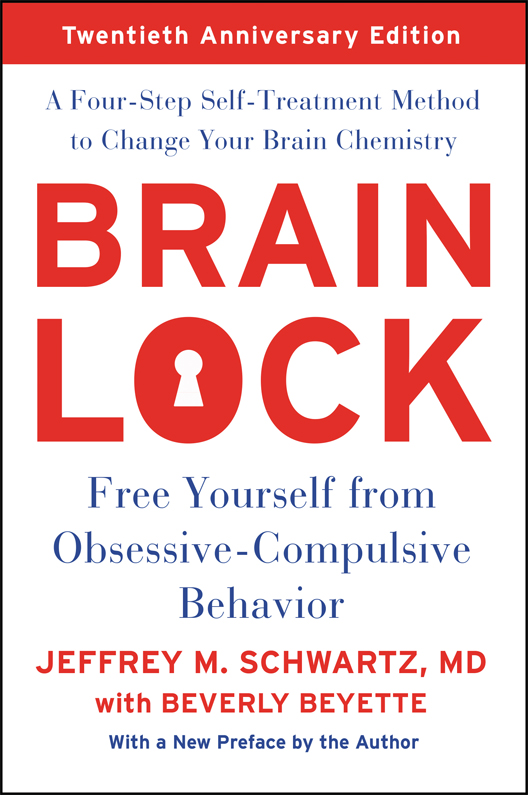
This book is dedicated to the memory of my grandfather
HARRY WEINSTEIN
and to the memory of my father
ISRAEL VICTOR SCHWARTZ
and to the memory of my step-father
GARY FLUMENBAUM
Three men who deeply knew, each in his own unique
way, that nothing makes sense without original sin.
This book, and all thats been learned in the twenty ensuing years about how to apply the Four Steps, has been made possible by the OCD sufferers with whom I have had the privilege of interacting in my work at UCLA and beyond. I would also like to give special thanks to Peter Whybrow, MD for his support of my appointment at UCLA, and to Beverly Beyette, who made a tremendous effort to help the book be as good and useful to as many people as we could make it.
Howard Hughes was dining with actress Jane Greer at Ciros on the Sunset Strip in Los Angeles one evening in 1947. At one point in the meal, he excused himself to go to the rest room. To Greers amazement, he did not return for an hour and a half. When he finally reappeared, she was astonished to see that he was soaking wet from head to toe.
What on earth happened to you? she asked. Well, Hughes said, I spilled some catsup on my shirt and pants and had to wash them out in the sink. He then let them dry for a while, hanging them over one of the toilet stalls. Once he put his clothes back on, he explained, I couldnt leave the bathroom because I couldnt touch the door handle. I had to wait for someone to come in.
According to Peter H. Brown, coauthor with Pat Broeske of Howard Hughes: The Untold Story, Jane Greer never went out with Hughes again.
Howard Hughes was eccentric, certainly, but he was not a freak. He was suffering from obsessive-compulsive disorder (OCD), a classic and severe case. By the end of his life, in 1976, he was overwhelmed by the disease. He spent his last days in isolation in his top-floor suite at the Princess Hotel in Acapulco, where he had sealed himself in a hospital-like atmosphere, terrified of germs. Blackout curtains at every window kept all sunlight out; the sun, he thought, might transmit the germs he so dreaded. Aides with facial tissues covering their hands brought him food, which had to be precisely cut and measured.
Rumors abounded that he was this reclusive because of drug abuse, a syphilitic condition, or terminal dementia. Actually, all his strange behaviors are readily understandable as symptoms of a severe case of OCD.
Sadly, there was no treatment for OCD in Howard Hughess lifetime. It would be another decade before the disease would be identified as a brain-related disorder.
I frequently cite the case of Howard Hughes to help my patients understand that this disease, OCD, is an insatiable monster. The more you give in, the hungrier it gets. Even Hughes, with all his millionsand a retinue of servants to perform the bizarre rituals his OCD told him to performcould not buy his way out. Eventually, the false messages coming from his brain overwhelmed him.
If you are one of many who suffer from OCD, whether it is a mild case or one as severe as Howard Hughess, this book will show you how to fight and beat it. OCD is a tenacious enemy, but a strong-willed, motivated person can overcome it.
Along the way, you will also learn a good deal about your brain and how you can control it better. You will read the stories of courageous people who, by applying the Four-Step Method, learned how to overcome the dreaded feelings of Brain Lock that are caused by OCD. This method, which has been scientifically demonstrated to enable people to change their own brain function, will be described in such a way that you can readily apply it yourself.
In the 2004 film The Aviator, Leonardo DiCaprio portrayed Howard Hughes. Dr. Jeffrey M. Schwartz was a consultant on the film, coaching the actor in OCD thought patterns and mannerisms. DiCaprio said he also read Brain Lock, so as to truly understand the idea of the sticky gearshift in Hughess brain.
The core concept of Brain Lockthat people with OCD can defeat their disease through self-directed behavioral therapy that actually changes their brainshas withstood the test of time. Now, twenty years after this book was first published, it is accepted as a classic finding in the history of neuroscience.
In scientific terms, this is neuroplasticity, a process resulting in changes to the brains structure, circuits, chemistry or functions in response to changes in its environment. And self-directed neuroplasticity, using the Four-Step program explained in this book, has empowered thousands of people with OCD to change their own brains.
Brain scans have clearly shown that the brains of OCD sufferers literally flare up with over activity, sending terribly bothersome and intrusive false messages (see images on the back cover). In the last two decades, further brain studies have validated the finding that putting these troubling feelings in proper context, calling them what they aresymptoms of a diseaseenables people to respond differently to their symptoms and, as a result, to regulate the structures of the emotional brain that play a key role in processing their feelings in reaction to the OCD-inducing stimuli.
This milestone edition of Brain Lock is not a revision. Its my sincere belief that there is no need to revise the Four-Step method. The cognitive-mindfulness treatment approach first presented in this book is now accepted as a standard outpatient OCD treatment.
Now, twenty years later, I continue doing research and working to help OCD sufferers. Ive concentrated also on further developing the Four-Step method to help peoplenot only those with neuropsychiatric problems like OCD, but those with no specifically diagnosed problemto perform at a higher and more effective level.
The method has proven very valuable, for example, in enhancing peoples capacities to develop their leadership abilities through use of the Wise Advocate concept, which youll read more about in these pages. In short, weve learned that the Four Steps can help anyone become more in touch with his or her True Self.
Since Brain Lock was first published, I have lectured at conferences in major world cities, spoken before the United Nations and appeared on widely viewed television programs, including the Today show Good Morning America, and The Oprah Winfrey Show.
This new peface serves to refine, and further clarify, the Four Steps to self-directed therapy: Relabel, Reattribute, Refocus and Revalue. When OCD patients Relabel, they are calling their disturbing thoughts and urges what they really are: obsessions and compulsions. When they Reattribute, they recognize that the bothersome thoughts wont go away because they are symptoms of a disease, OCD. When they Refocus, they work around the intrusive thoughts by doing a constructive, enjoyable behavior. When they Revalue, they learn to ignore those thoughts and view them as worthless distractions.
Patients who have used this method have told courageous, though often heartbreaking, stories about their lives before the Four Steps. Happily, many stories have had inspiring outcomes. In sharing them, they have provided illuminating insights for all OCD sufferers.
Anna, who related her story in Brain Lock, was once suicidal. For years, she had obsessed that her husband was unfaithful. She would bombard him relentlessly with questions: When had he last seen a former girlfriend? Did he read girlie magazines?
Font size:
Interval:
Bookmark:
Similar books «Brain Lock, Twentieth Anniversary Edition: Free Yourself from Obsessive-Compulsive Behavior»
Look at similar books to Brain Lock, Twentieth Anniversary Edition: Free Yourself from Obsessive-Compulsive Behavior. We have selected literature similar in name and meaning in the hope of providing readers with more options to find new, interesting, not yet read works.
Discussion, reviews of the book Brain Lock, Twentieth Anniversary Edition: Free Yourself from Obsessive-Compulsive Behavior and just readers' own opinions. Leave your comments, write what you think about the work, its meaning or the main characters. Specify what exactly you liked and what you didn't like, and why you think so.

